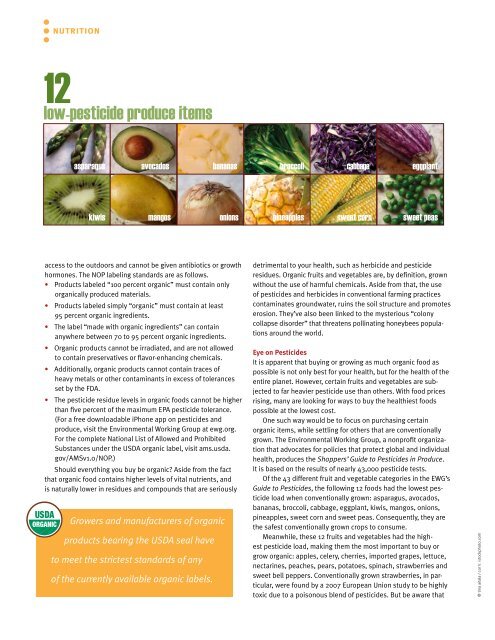Organic Foods: Know the Facts - Dr. Trent Maly
Organic Foods: Know the Facts - Dr. Trent Maly
Organic Foods: Know the Facts - Dr. Trent Maly
You also want an ePaper? Increase the reach of your titles
YUMPU automatically turns print PDFs into web optimized ePapers that Google loves.
nutrition<br />
12 low-pesticide produce items<br />
asparagus<br />
kiwis mangos<br />
avocados bananas<br />
access to <strong>the</strong> outdoors and cannot be given antibiotics or growth<br />
hormones. The NOP labeling standards are as follows.<br />
• Products labeled “100 percent organic” must contain only<br />
organically produced materials.<br />
• Products labeled simply “organic” must contain at least<br />
95 percent organic ingredients.<br />
• The label “made with organic ingredients” can contain<br />
anywhere between 70 to 95 percent organic ingredients.<br />
• <strong>Organic</strong> products cannot be irradiated, and are not allowed<br />
to contain preservatives or flavor-enhancing chemicals.<br />
• Additionally, organic products cannot contain traces of<br />
heavy metals or o<strong>the</strong>r contaminants in excess of tolerances<br />
set by <strong>the</strong> FDA.<br />
• The pesticide residue levels in organic foods cannot be higher<br />
than five percent of <strong>the</strong> maximum EPA pesticide tolerance.<br />
(For a free downloadable iPhone app on pesticides and<br />
produce, visit <strong>the</strong> Environmental Working Group at ewg.org.<br />
For <strong>the</strong> complete National List of Allowed and Prohibited<br />
Substances under <strong>the</strong> USDA organic label, visit ams.usda.<br />
gov/AMSv1.0/NOP.)<br />
Should everything you buy be organic? Aside from <strong>the</strong> fact<br />
that organic food contains higher levels of vital nutrients, and<br />
is naturally lower in residues and compounds that are seriously<br />
Growers and manufacturers of organic<br />
products bearing <strong>the</strong> USDA seal have<br />
to meet <strong>the</strong> strictest standards of any<br />
of <strong>the</strong> currently available organic labels.<br />
onions pineapples<br />
broccoli cabbage<br />
eggplant<br />
sweet corn sweet peas<br />
detrimental to your health, such as herbicide and pesticide<br />
residues. <strong>Organic</strong> fruits and vegetables are, by definition, grown<br />
without <strong>the</strong> use of harmful chemicals. Aside from that, <strong>the</strong> use<br />
of pesticides and herbicides in conventional farming practices<br />
contaminates groundwater, ruins <strong>the</strong> soil structure and promotes<br />
erosion. They’ve also been linked to <strong>the</strong> mysterious “colony<br />
collapse disorder” that threatens pollinating honeybees populations<br />
around <strong>the</strong> world.<br />
Eye on Pesticides<br />
It is apparent that buying or growing as much organic food as<br />
possible is not only best for your health, but for <strong>the</strong> health of <strong>the</strong><br />
entire planet. However, certain fruits and vegetables are subjected<br />
to far heavier pesticide use than o<strong>the</strong>rs. With food prices<br />
rising, many are looking for ways to buy <strong>the</strong> healthiest foods<br />
possible at <strong>the</strong> lowest cost.<br />
One such way would be to focus on purchasing certain<br />
organic items, while settling for o<strong>the</strong>rs that are conventionally<br />
grown. The Environmental Working Group, a nonprofit organization<br />
that advocates for policies that protect global and individual<br />
health, produces <strong>the</strong> Shoppers’ Guide to Pesticides in Produce.<br />
It is based on <strong>the</strong> results of nearly 43,000 pesticide tests.<br />
Of <strong>the</strong> 43 different fruit and vegetable categories in <strong>the</strong> EWG’s<br />
Guide to Pesticides, <strong>the</strong> following 12 foods had <strong>the</strong> lowest pesticide<br />
load when conventionally grown: asparagus, avocados,<br />
bananas, broccoli, cabbage, eggplant, kiwis, mangos, onions,<br />
pineapples, sweet corn and sweet peas. Consequently, <strong>the</strong>y are<br />
<strong>the</strong> safest conventionally grown crops to consume.<br />
Meanwhile, <strong>the</strong>se 12 fruits and vegetables had <strong>the</strong> highest<br />
pesticide load, making <strong>the</strong>m <strong>the</strong> most important to buy or<br />
grow organic: apples, celery, cherries, imported grapes, lettuce,<br />
nectarines, peaches, pears, potatoes, spinach, strawberries and<br />
sweet bell peppers. Conventionally grown strawberries, in particular,<br />
were found by a 2007 European Union study to be highly<br />
toxic due to a poisonous blend of pesticides. But be aware that<br />
© tina aitala / corn: istockphoto.com


